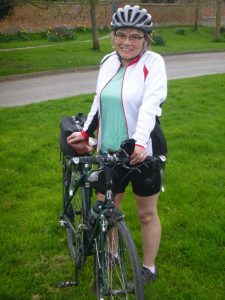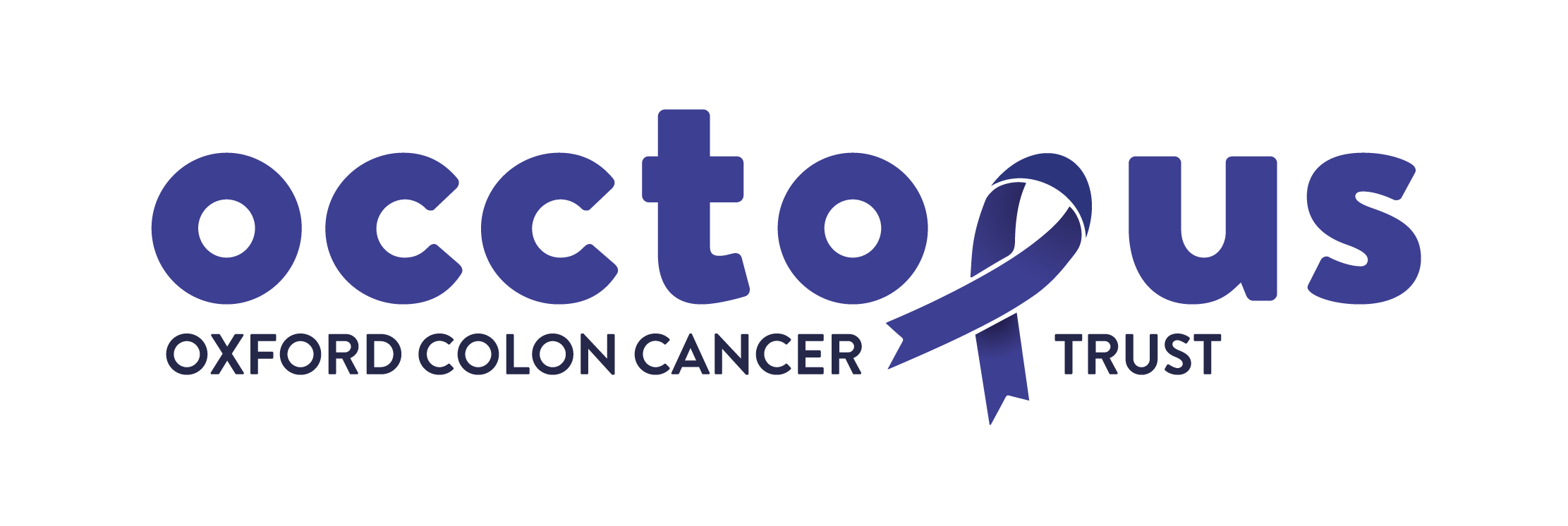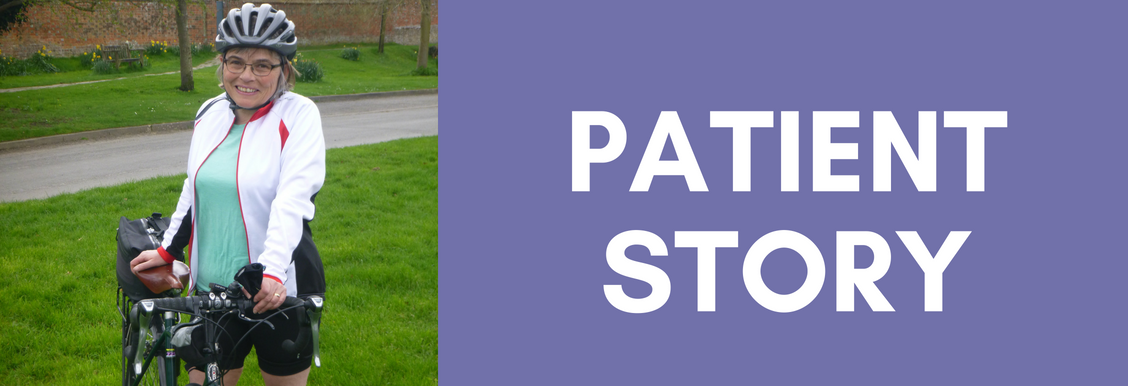Following a diagnosis of colorectal cancer, Barbara went through several rounds of chemotherapy and radiotherapy, leading her to have part of her bowel removed through APER surgery as well as a stoma. The treatments were long and exhausting. Incredibly, some months on, she is now training for a sponsored bike ride, to cycle over 1,000 miles in twenty-six days from Land’s End to John O’Groats. Read Barbara’s story.
In January 2016, a few days after my 56th birthday, I plucked up the courage to go to my GP with symptoms of what I suspected might be bowel cancer. After an anxious few weeks of waiting for the results of tests and scans, I received a diagnosis of colorectal cancer (T3 N1 M0). I was told I would need to undergo five weeks of chemotherapy and radiotherapy to shrink the tumour so that it could be removed by surgery and that it was quite likely that I would need either a temporary or permanent stoma. I had prepared myself for the worst, thinking that the cancer might have spread all around my body and I might only have a few months left – so this news wasn’t quite as devastating as it might have been. The prospect of having a colostomy bag sounded a bit grim but at least I’d still be here!
The prospect of having a colostomy bag sounded a bit grim but at least I’d still be here!
The radiotherapy and chemotherapy started in April – daily trips to the Churchill Hospital for radiotherapy, and capecitabine tablets taken twice daily, with every weekend off. I didn’t suffer too much from side effects, though I was so lacking in energy that I was unable to ride my bike to work, and towards the end of the treatment, I started getting a very sore bottom due to the radiotherapy! Luckily, I bounced back fairly quickly and three weeks after the treatment finished I was able to go on a cycling holiday in the Shetland Islands which I’d planned prior to my diagnosis.
Post-treatment scans were initially very encouraging – the tumour had pretty much gone – maybe I didn’t need to have surgery after all? Alas, a colonoscopy revealed that the tumour was indeed still there. Still, there was no doubt the tumour had responded well to treatment and this was good news. After talking through the options with my consultant, Mr Cunningham, I decided to go for APER surgery. I was going to have the lower part of my bowel removed and would need a permanent colostomy.
In November 2016, I was operated on at the Churchill Hospital. Memories of my time spent in hospital are a bit hazy. I’d been warned about being in pain afterwards – but most of the discomfort I felt was due to bloating. I felt very tired but tried to keep mobile by regularly having short walks around the ward and, as I got more confident, around the hospital. After 10 long days, I was able to go home.
My tummy muscles needed a bit of toning up, so I did some gentle abdominal exercises to strengthen them.
At first, I felt exhausted every day and had to have a sleep every afternoon, but I still managed three short walks every day, always accompanied by my husband Andy. Most of the rest of the day was spent lying down – sitting on my bottom just wasn’t possible! I had to learn how to cope with a stoma which wasn’t too bad, but I do remember feeling the need to cradle the bag with my hands to support it every time I went out for a walk. My tummy muscles needed a bit of toning up, so I did some gentle abdominal exercises to strengthen them. My skin reacted to the adhesive on the bags which I found a bit worrying but eventually, I found a type of bag that suited me, and I’ve been fine ever since. During this time, I did feel a little cut off from health professionals but luckily Becky, one of the nurses at my GPs surgery, took me under her wing. She saw me several times and was very supportive, reassuring me that my wound was healing okay.
It was Christmas day before I managed to go a whole day without a nap! By the start of February, I was feeling really well – only then I was told it would be a good idea if I had another course of chemotherapy which I was dismayed to discover would be six cycles of three weeks. On the first day of each cycle, I went off to the Churchill for a dose of oxaliplatin and for the first two weeks of each cycle I had to take capecitabine tablets again at a higher dose than last time – and the third week was drug-free. Oxaliplatin caused me to have peripheral neuropathy. It was worse in cold weather and I remember covering my face with a scarf whenever I went out – though this improved towards the end of each cycle.

Whilst I was recuperating it occurred to me that when I was well enough, I should do something to show my appreciation for the treatment I’d had. I’ve always enjoyed cycling and I’ve been on a few cycle touring holidays – usually averaging about 35 miles a day, over several days. The idea of doing a sponsored bike ride from Land’s End to John O’Groats popped into my head. I tried to suppress it because I knew that, at over 1000 miles, this would be a much bigger undertaking than I have ever done before. But the idea wouldn’t go away and I felt if I didn’t do it I would forever feel I’d wimped out! I decided to go for it, and so in July I will set off from Land’s End with my husband (who has volunteered to carry all my gear!) and will spend the next twenty-six days, averaging just under 50 miles a day, cycling to John O’Groats – this includes 3 days off. I started training after Easter, and completed the Isle of Wight Randonee in May, cycling sixty six miles which is the furthest I’ve ever cycled in one day, as well as the “Coast to Coast” at the end of May (from Workington to Sunderland).
…at over 1000 miles, this would be a much bigger undertaking than I have ever done before.
I decided to do the sponsored ride for Occtopus because I benefited greatly from the type of surgery it has pioneered. I shall always be truly grateful to Mr Cunningham who together with Mr Hompes operated on me so skilfully. It always amazed me how Mr Cunningham managed to give the impression of having all the time in the world when he spoke to me, when I’m sure in reality he was rushed off his feet. The care I received on the Jane Ashley Ward at the Churchill was superb and I always felt I was in safe hands. Everyone – from the doctors, nurses, healthcare assistants, the people serving meals, and many more – were very kind. Thank you to the cancer specialist nurses – in particular Vanessa and Rosie who treated me the most – you were all lovely. And thank you also to the stoma nurses, the staff of the radiotherapy unit, and the endoscopy unit at the JR.
Thank you Barbara for your brave determination and we wish you the very best with your training!
If you would like to support Barbara on her sponsored cycle from Land’s End to John O’Groats , please do visit her Just Giving page.

